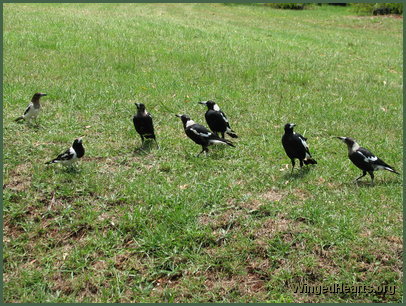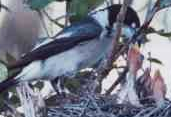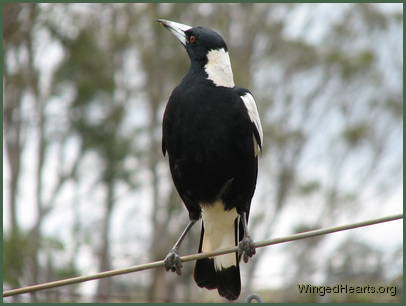Maggie Magpie and family with butcherbird friends
 |
Until we met our magpies I had never really thought about animals having complex social systems. It’s pretty easy to think of animals as “dumb animals”! But our Maggie, sadly no longer with us, changed all that. By ‘adopting’ us into his family and introducing us to so many new friends of many bird species, Maggie opened a new world to us. All around us, birds (and, as stories from others show, other animals too) are conducting complex friendships, negotiations, and deals; they make promises, work to find good ‘positions’ in the world for their kids, and much more.
We humans get a bit uneasy when we discover we aren’t quite as far advanced beyond other animals as we like to think we are; laws of inheritance are a case in point. Surely no other animal has inheritance laws?
Well, there are clearly defined magpie inheritance laws. The countryside around our house is divided up in various ways by the various species. Magpies have one ‘map’ of the territory, on which they define the boundaries between their lands. The two species of butcherbirds here, pied and grey, share a single map between them. In other words, the magpies ignore the butcherbirds sharing their territories and vice versa, but the pied butcherbirds and the grey butcherbirds very much do take notice of each other and refuse to allow the other species into their zone. The butcherbird system has its own complexities, which I haven’t completely worked out, but I think I can tell you some details about magpie inheritance laws that might help you make sense of magpie activities around your place when a magpie dies.




 Yesterday Gitie and I went to see how Vicky and Bertie are doing this year on the nesting front. Although Vicky's nest is in line with our breakfast room, it is distant and we have not been able to set up the telescope this year. So imagine our delight when we found Vicky sitting proudly on the nest. The nest is in a tricky spot, so Gitie stayed by the road while I went through the paddock to the nesting tree. This is the tree that Vicky and Maggie purchased from a crow some years ago, giving the crow their old tree and nest in return, as well as rights to get food from their human friends (us) for a year). The crow made Vicky's old nest bigger and stronger, while Vicky lined the crow's nest with lots of soft material.
Yesterday Gitie and I went to see how Vicky and Bertie are doing this year on the nesting front. Although Vicky's nest is in line with our breakfast room, it is distant and we have not been able to set up the telescope this year. So imagine our delight when we found Vicky sitting proudly on the nest. The nest is in a tricky spot, so Gitie stayed by the road while I went through the paddock to the nesting tree. This is the tree that Vicky and Maggie purchased from a crow some years ago, giving the crow their old tree and nest in return, as well as rights to get food from their human friends (us) for a year). The crow made Vicky's old nest bigger and stronger, while Vicky lined the crow's nest with lots of soft material.





